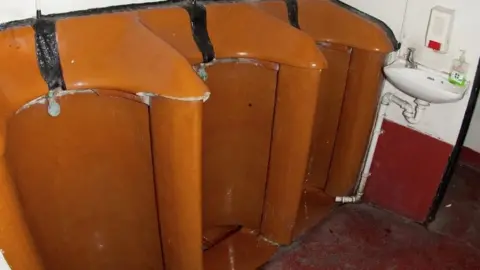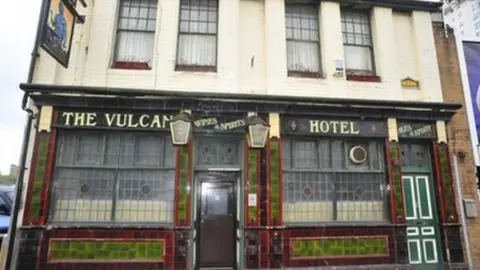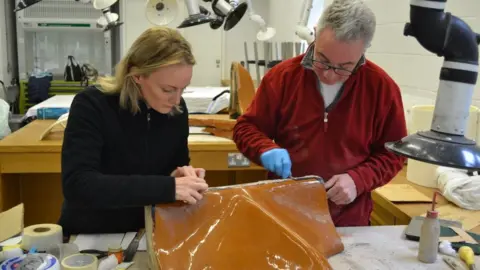St Fagans National Museum of History saves historic urinals from Vulcan pub
A team rebuilding a pub at a museum have managed to save distinctive orange-brown urinals from the venue.
The Vulcan, a 170-year-old Cardiff drinking haunt, closed in 2012, with the building facing an uncertain future.
But workers took it down brick-by-brick and are rebuilding it at St Fagans National Museum of History.
Their attention to detail has even seen the distinctive 1914 urinals from the Adam Street pub restored.
They will be an unusual if practical exhibit when the pub reopens at the museum in two years' time - but only for male visitors.
 National Museum Wales
National Museum Wales"Having announced that work had begun on rebuilding of the iconic Vulcan Hotel, one question we received was 'will it still smell of Domestos?' It won't, but it will have its original urinals," officials said.
The Vulcan Hotel was built in 1853, serving mainly the Irish community in the area, and closed in 2012.
In 2020, National Museum Wales began rebuilding it brick-by-brick as part of a three-year project to recreate it at St Fagans.
 PA Media
PA MediaThe museum hopes the pub will help tell the story of an expanding and changing Cardiff at the end of the 19th and start of the 20th centuries.
Principal curator Jennifer Protheroe-Jones said the Vulcan would be displayed as it was in 1915, including the original exterior tiles and sign.
But the urinals, which were installed as part of a substantial refurbishment in 1914, have been the focus of just as much attention.
Officials said that during their near 100 years of use they had sustained damage, with specialist ceramic conservators commissioned to work on them.
"After a thorough clean, they were restored not just to museum standard but to a standard that will allow them to be used once again for their intended purpose," a spokeswoman said.
 National Museum Wales
National Museum Wales"It's a shame though that once we reopen the pub, only half of our audience will ever be able to see them!"
When The Vulcan opens at the site in 2023, it will join other buildings from Wales' past that have been reconstructed there, including a working men's club, chapel, farm, shops and houses.
